Periodontal Therapy – Dallas, TX
How We Keep Gum Disease Under Control
Cavities are often seen as the biggest threat to oral health, but gum disease is also a common and potentially dangerous problem that you need to watch out for. Gum disease is the leading cause of tooth loss, and it affects nearly half of all adults over the age of 30. If you notice the signs of gum disease or are diagnosed with gum disease during a dental checkup, you should begin treatment right away. Get in touch with Central Perio today to set up an appointment to have your gum disease examined and taken care of with periodontal therapy in Dallas, TX.

Why Choose Central Perio for Periodontal Therapy?
- Minimally Invasive Treatment Options
- State of the Art Periodontal Technology
- Focus on Overall Health and Wellness
What is Periodontal Disease?
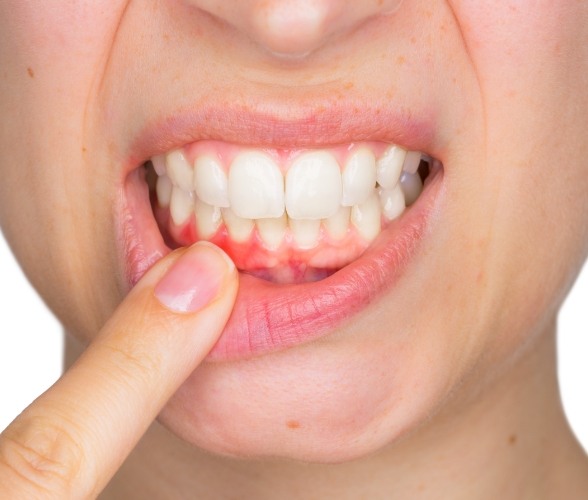
Periodontal disease is another name for gum disease. It’s typically the result of infections and inflammations of the gum and the underlying jawbone. The earliest stage is called gingivitis, which may cause swollen gums and bleeding. The later – and far more serious – stage is known as periodontitis, and it often involves bone loss, gum recession, and permanent teeth coming loose or even falling out. Periodontal disease can affect virtually anybody, but it is more prevalent in older adults, and it affects men more often than women.
Periodontal Disease & Whole-Body Connection

The “whole-body connection” refers to how problems in your mouth can affect the rest of your body. Periodontal disease is a prime example of this, as it has been tied to several other health conditions. For example, people with gum disease are more likely to suffer from heart attacks and strokes, and they may also have an increased risk for Alzheimer’s. Treating gum disease doesn’t guarantee that you avoid such health problems, but at the very least it can help lower your personal risk.
Minimally Invasive Treatment

At Central Perio, we prefer a minimally invasive treatment approach whenever possible. This approach may take longer than traditional surgical treatments, but it’s also more comfortable, and the results tend to be more attractive. Having a minimally invasive option can be especially helpful for those that are nervous about undergoing periodontal therapy. We will be happy to go over the options for minimally invasive treatment during your initial consultation once we have examined your mouth.
Learn About Minimally Invasive Treatment
Surgical Treatment
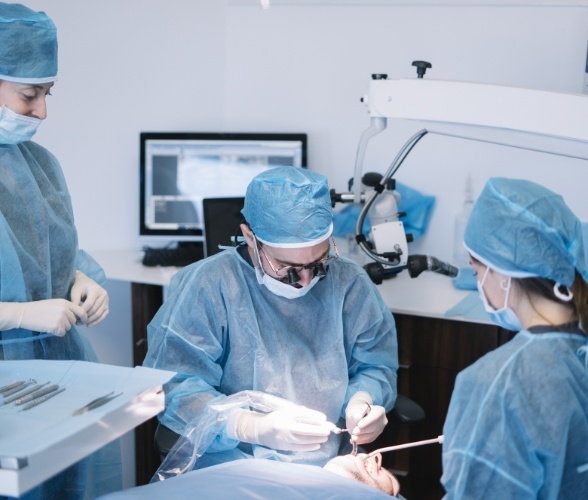
While we’re proud to be able to offer minimally invasive surgery, we still perform traditional periodontal surgeries when necessary. This approach is generally faster and more direct, so it may be your best choice under certain circumstances. Dr. Tunnell will always do what’s best for each individual patient, so the approach he takes will be determined by the situation.
Learn About Surgical Treatment
Scaling & Root Planing
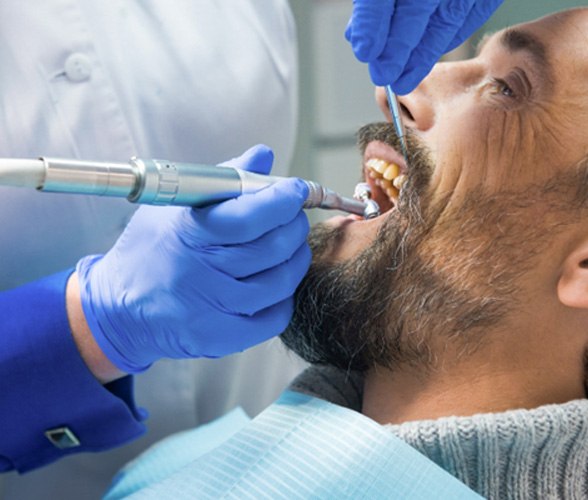
Scaling and root planing are collectively known as a deep cleaning. They are used to remove plaque and tartar from below the gumline to treat periodontal disease. Scaling is the actual process of removing these harmful substances while root planing is the step that focuses on helping the smile recover afterward. The roots of the teeth are smoothed out, creating a surface where bacteria can’t attach themselves as easily, allowing the nearby gum tissue to heal properly. If you have any questions or concerns following your treatment, don’t hesitate to call our office .
Do I Need Scaling & Root Planing?

Our specially trained, board-certified periodontist, Dr. John Tunnell , has completed in-depth clinical and academic training to be able to not only treat, but also accurately spot signs of gum disease. If we see or you let us know that you’re experiencing any of the following symptoms, we’ll likely recommend scaling and root planing:
- Gum recession
- Bleeding whenever you brush or floss
- Chronic bad breath
- A bad taste in your mouth
- Shifting or loose teeth
- Difficulty chewing or pain while biting down
- Visible tartar and plaque accumulation
The Process of Scaling & Root Planing

Scaling and root planing in Dallas typically takes place over the course of two appointments to our office. First, Dr. Tunnell will thoroughly remove all plaque and tartar from the surface of your teeth, as far down as the pockets of the gums. This will minimize bacteria accumulation within the mouth and will help your body fight off the infection.
At your second appointment, Dr. Tunnell will remove deposits of bacteria on the roots of the teeth. This will ideally allow your gums to healthily reattach to your teeth, protecting the vulnerable structure and preventing further bone deterioration.
Aftercare Tips for Scaling & Root Planing

Your mouth will be numbed with a local anesthetic before your procedure, so you likely won’t start to feel lingering discomfort and soreness for quite awhile after your appointment. Avoid eating until the effects of the anesthetic have worn off, as this could cause you to accidentally bite your cheek or tongue. For the following days, it’s important to keep your mouth clean by rinsing with salt water every several hours. This can also help relieve discomfort and soreness. Continue to brush your teeth as you normally would, just be very gentle near your gumline and treated areas.
Periodontal Cleanings

Periodontal cleanings are different from regular dental cleanings; while the latter is a preventive measure to stop cavities and gum disease from forming in the first place, the former is only performed after the damage has already been done. Also, periodontal cleanings are usually performed every three to four months, in contrast to biannual regular cleanings. This is because more frequent appointments are necessary to prevent an infection from causing additional damage or pain.
Periodontal Maintenance
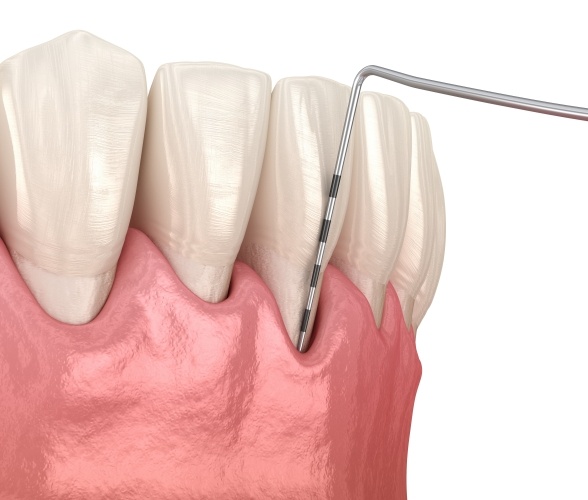
One appointment is not enough to stop advanced gum disease for good. In fact, gum disease typically can’t be cured; it can only be controlled so that it doesn’t cause tooth loss. This is where periodontal maintenance comes in. Regular treatments are often required to keep bacteria levels under control and to monitor potentially troublesome symptoms such as gum recession. Periodontal maintenance typically involves regular scaling and root planing procedures to combat ongoing periodontal disease.
Oral Cancer Screening
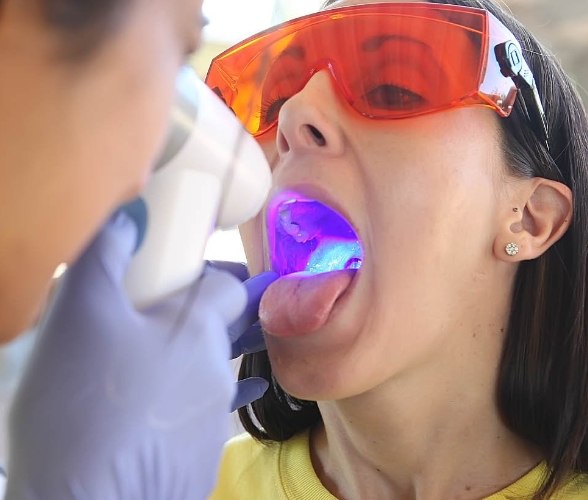
Gum disease does not cause oral cancer, but the presence of one could potentially increase your risk for the other. Furthermore, gingivitis and oral cancer have similar symptoms, so some people may end up getting them confused. When we’re examining your mouth for gum disease, we’ll also be on the lookout for potential signs of oral cancer. If we see anything that requires an expert’s attention, we will let you know right away and help you plan your next steps.
